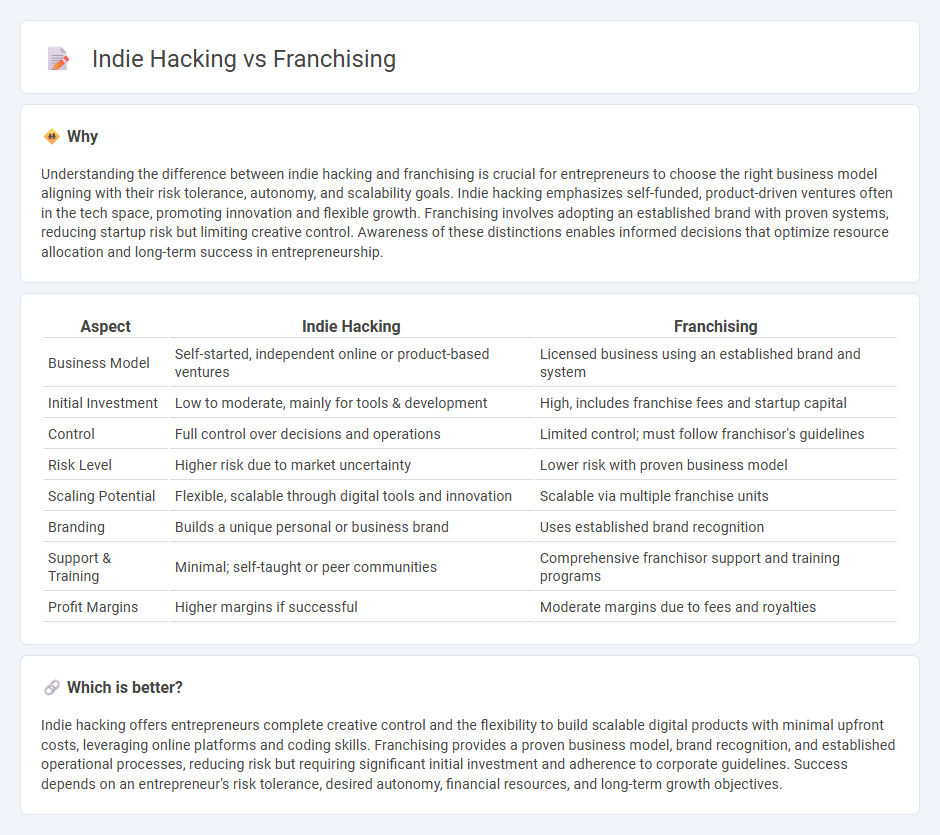
Indie hacking involves building and scaling a startup independently, leveraging digital tools, and often focusing on lean growth with minimal initial investment. Franchising offers a proven business model with established brand recognition, requiring adherence to franchisor guidelines and upfront franchise fees. Explore the advantages and challenges of each path to determine the best entrepreneurial route for your goals.
Why it is important
Understanding the difference between indie hacking and franchising is crucial for entrepreneurs to choose the right business model aligning with their risk tolerance, autonomy, and scalability goals. Indie hacking emphasizes self-funded, product-driven ventures often in the tech space, promoting innovation and flexible growth. Franchising involves adopting an established brand with proven systems, reducing startup risk but limiting creative control. Awareness of these distinctions enables informed decisions that optimize resource allocation and long-term success in entrepreneurship.
Comparison Table
| Aspect | Indie Hacking | Franchising |
|---|---|---|
| Business Model | Self-started, independent online or product-based ventures | Licensed business using an established brand and system |
| Initial Investment | Low to moderate, mainly for tools & development | High, includes franchise fees and startup capital |
| Control | Full control over decisions and operations | Limited control; must follow franchisor's guidelines |
| Risk Level | Higher risk due to market uncertainty | Lower risk with proven business model |
| Scaling Potential | Flexible, scalable through digital tools and innovation | Scalable via multiple franchise units |
| Branding | Builds a unique personal or business brand | Uses established brand recognition |
| Support & Training | Minimal; self-taught or peer communities | Comprehensive franchisor support and training programs |
| Profit Margins | Higher margins if successful | Moderate margins due to fees and royalties |
Which is better?
Indie hacking offers entrepreneurs complete creative control and the flexibility to build scalable digital products with minimal upfront costs, leveraging online platforms and coding skills. Franchising provides a proven business model, brand recognition, and established operational processes, reducing risk but requiring significant initial investment and adherence to corporate guidelines. Success depends on an entrepreneur's risk tolerance, desired autonomy, financial resources, and long-term growth objectives.
Connection
Indie hacking and franchising are connected through their focus on scalable business models and autonomy in entrepreneurship. Indie hackers often develop digital products or small businesses with the goal of creating replicable revenue streams, while franchising enables entrepreneurs to expand a proven business concept across multiple locations. Both approaches emphasize systematization and growth potential, allowing entrepreneurs to leverage innovation or established brand equity for sustainable success.
Key Terms
Business Model
Franchising offers a proven business model with established branding, operational support, and a replicable system, reducing risk and accelerating market entry. Indie hacking relies on creating and scaling independent projects with complete control, often emphasizing innovation, flexibility, and low overhead costs. Explore the strengths and trade-offs of both approaches to determine the best fit for your entrepreneurial goals.
Ownership Structure
Franchising offers a structured ownership model where franchisees operate under a parent company's brand, following established systems and guidelines. Indie hacking emphasizes complete ownership and autonomy, enabling founders to build and scale businesses independently without external control. Explore the advantages and challenges of each ownership structure to decide which path aligns best with your entrepreneurial goals.
Revenue Stream
Franchising generates revenue streams primarily through upfront franchise fees, ongoing royalties, and sales of proprietary products or services, providing a predictable income model supported by established brand recognition. Indie hacking relies on diverse revenue streams such as subscription models, advertising, affiliate marketing, or one-time sales, allowing for greater flexibility but with higher variability and risk. Explore the advantages and challenges of each approach to optimize your revenue strategy.
Source and External Links
Franchising - Wikipedia - Franchising is a business strategy where a franchisor licenses its brand, know-how, and business model to a franchisee in exchange for fees, allowing expansion with minimized capital investment and risk for the franchisor.
Franchising Overview - International Franchise Association - Franchising allows a franchisor to grant rights to franchisees to operate businesses under an established brand, providing training and support while franchisees pay fees and operate day-to-day, benefiting from reduced risk and established brand recognition.
Franchising - Entrepreneur Small Business Encyclopedia - A franchise gives franchisees the right to use a franchisor's trademark and business system in return for fees, offering a proven operational model, training, and support to reduce the typical startup challenges.
 dowidth.com
dowidth.com